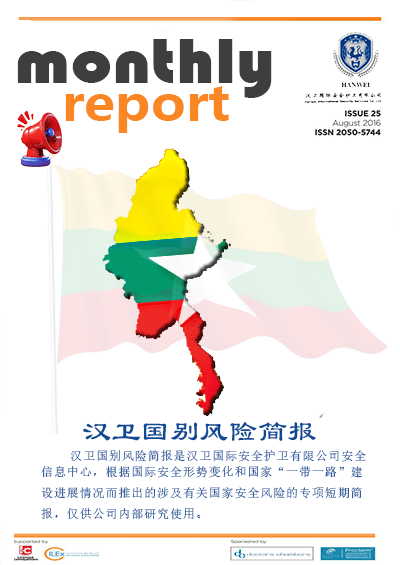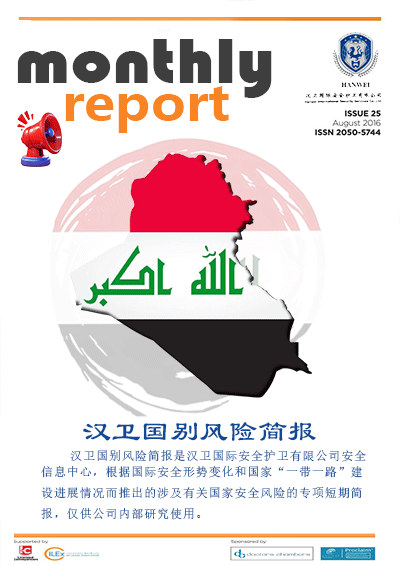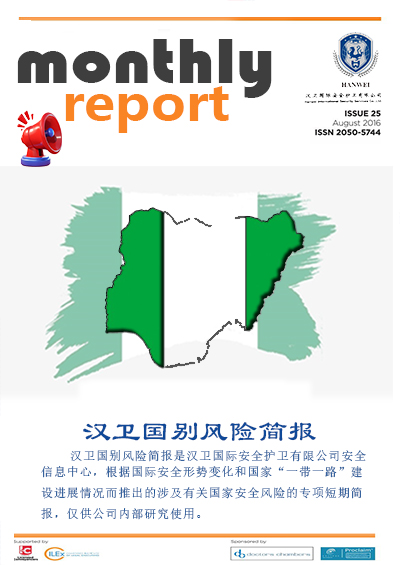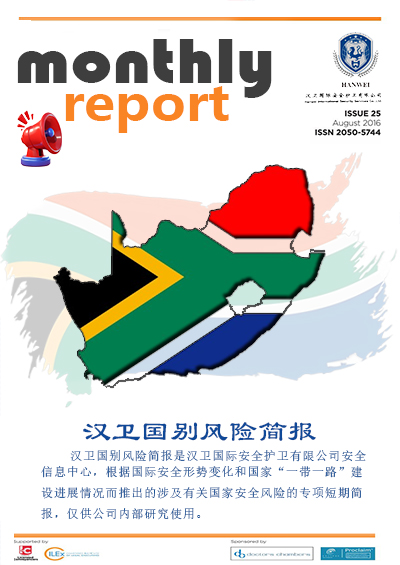Researcher No. 007
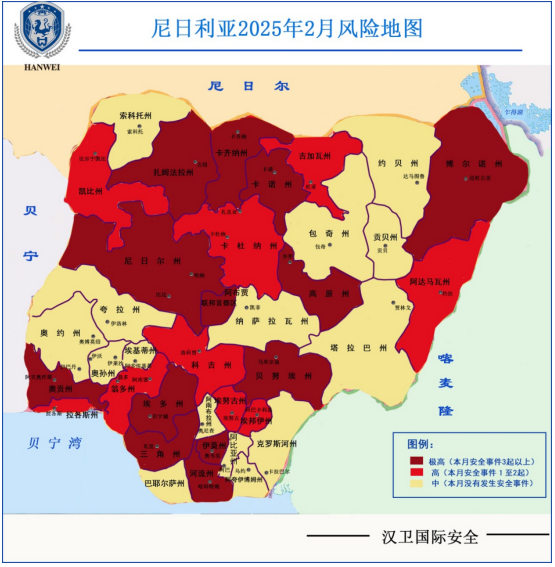
According to the monitoring report of the Security Officer of Hanwei International stationed in West Africa and comprehensive media reports, a total of 68 security incidents occurred in Nigeria in February 2025. A total of 249 civilians and 10 military and police personnel were killed in various security incidents, and at least 187 people were kidnapped. The types of security incidents mainly include armed attacks and kidnappings, conflicts between farmers and herdsmen, and public security accidents, etc. Compared with last month, the number of security incidents has increased by 20, the death toll has decreased by 178, and the number of kidnappings has risen by 80. Analysis suggests that the security situation in Nigeria has deteriorated this month. Armed attacks and kidnappings have continued to occur frequently in the central and northern, central and southern, and northeastern regions, with a significant increase in high-risk areas. Meanwhile, public safety incidents such as traffic accidents have caused a large number of casualties, and the overall safety situation is complex and severe. Among them, the security risk levels in the central-northern, central-southern and northeastern parts of Nigeria are extremely high, while those in other regions are high or medium-high.
I. Comprehensive Analysis of Security Incidents
Among the 68 security incidents that occurred in Nigeria in February, 19 were armed attacks, accounting for 27% of the total. There were 21 cases of armed kidnapping, accounting for 30%. There were 12 public safety incidents, accounting for 17%. There were 4 armed conflicts among nomads, accounting for 6%. There were two marches and strikes, accounting for 3%. There were 10 military clearance operations, accounting for 14%. A total of 399 people were killed and at least 187 were kidnapped in various incidents. Among the deceased, there were 249 civilians, 10 military and police officers, and 140 terrorists were killed.
The overall security situation presents the following characteristics:
(1) High-risk areas have significantly increased.In February, security incidents in Nigeria were mainly concentrated in the central-northern Zamfarah State, Niger State, Kazina State, Kano State, Plateau State, as well as the central-eastern Borno State, and the central-southern Benue State, Rivers State, and Imo State. There were 13 high-risk areas, significantly higher than the 7 in the previous month. Among them, the Zamfarah State and Niger State in the central-northern part have the highest security risks, with 6 security incidents occurring in each state. The main ones include armed attacks, kidnappings, and crackdown operations, resulting in 80 and 29 deaths respectively, and 36 people were kidnapped. Five security incidents occurred in both the central-northern state of Cassina and the central-southern state of Benue, mainly including armed attacks, armed kidnappings and religious conflicts, resulting in 12 and 23 deaths respectively and 57 kidnappings. According to the monitoring report of the security officer of Hanwei International stationed in West Africa, the security risks in the northeastern region of Nigeria have intensified with the arrival of the rainy season. Terrorist organizations plan to carry out kidnappings or attacks in some areas. The main areas are: the regions surrounding the major cities in Borno State, the roads between the major cities in Borno State, and the border areas between Nigeria and Cameroon and Chad, especially the forest areas near Lake Chad and the forest areas at the border between Nigeria and Cameroon within Adamawa State. (See the attached picture
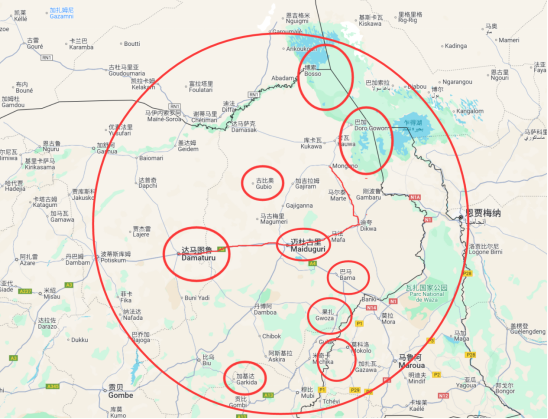
Figure 1: Distribution Diagram of Security Incidents in February
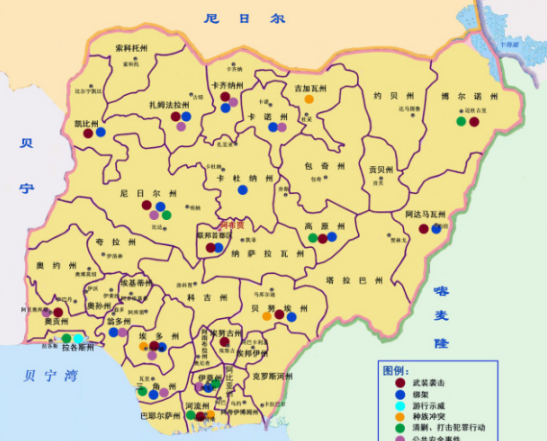
Chart 1: Statistics of Security Incidents in Major Regions in February
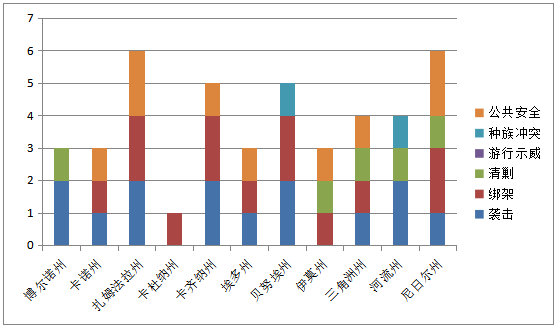
(2) Armed attacks and kidnappings continue to occur frequently, and the counter-terrorism situation is severe.In February, 19 armed attacks and 21 armed kidnappings occurred in Nigeria, resulting in 61 deaths and at least 187 kidnappings. This month, armed attacks and kidnappings have mostly occurred in the central-northern and northeastern regions. Particularly in the Lake Chad Basin, the two major terrorist organizations, Boko Haram and Islamic State West Africa Province, have continuously carried out armed attacks, causing significant casualties and property losses in the local area. Among them, Borno State was repeatedly attacked by armed terrorists from Boko Haram/Islamic State West Africa Province (ISWAP) in February, resulting in 10 deaths, multiple injuries and the destruction of many buildings. On February 17th and 25th, Boko Haram militants launched two attacks in the state of Adama near the Lake Chad Basin, kidnapping four people, setting fire to many schools, houses and enterprises, and looting valuable assets. In early February, at the Fifth Lake Chad Basin Governors Forum held in Maiduguri, Borno State, Alan Akpaji, the representative of the United Nations Population Fund in Burkina Faso and the Regional Director for West and Central Africa of the United Nations Population Fund, said that according to the report released by the United Nations Population Fund (UNFPA), from January 2024 to January 2025, The conflict in the Lake Chad Basin has displaced more than 6 million people, with 2.3 million in Nigeria alone. At present, the living conditions of the disadvantaged groups in this area are worrying. They continue to face serious problems of food insecurity and malnutrition, and their access to basic services is deteriorating. For instance, when fetching water, gathering firewood, going to farms and markets, walking to the toilet or getting services, one is often attacked by armed men. In response, Pat Akm, the former commander of the Nigerian Army Gendarmerie, stated that the current strength of the Nigerian army is approximately 230,000, and it is clearly inadequate to confront terrorist organizations over the long term. He believes that the Nigerian army must have at least 500,000 troops to meet the actual needs. Take the northeastern theater of Nigeria as an example. Even though the military has achieved phased victories in one difficult clearance operation after another, it often loses all its previous efforts due to the lack of sufficient troops to hold the position later on. Although the terrorists were repelled, due to the weak defense, they would quickly make a comeback and it would be impossible to achieve true long-term stability.
(3) Multiple incidents related to China have occurred.In February, multiple incidents involving China occurred again in Nigeria. On February 5th, the Economic and Financial Crimes Commission (EFCC) of Nigeria officially indicted 11 Chinese citizens in Lagos, accusing them of online fraud, identity theft, and attempting to undermine the stability of the Nigerian constitution. All 11 defendants denied the charges when they appeared in the Federal High Court of Lagos. The judge immediately ordered that all the defendants be detained at the Ikoi Correctional Facility, awaiting further trials on February 21 and March 7, 2025. At 3:25 p.m. on February 15th, a construction site of a Chinese-funded enterprise near the A3 road in Ebe Village, northern Udi Local Government District, Enugu State, Nigeria, was attacked by armed bandits. Thanks to the timely rescue, no casualties or property damage were caused. Thirdly, on February 17th, a Chinese expatriate was blackmailed by the police in Lagos State. On that day, three police officers stopped the overseas Chinese and asked him to show his green card and other documents. The overseas Chinese presented the relevant documents from the mobile phone's image library, but the police demanded 100,000 naira on the grounds that they did not have the original documents.
(4) Major casualties are caused by public safety incidents such as traffic accidents.In February, Nigeria witnessed six major traffic accidents, two fire and explosion incidents, one shipwreck and one accidental bombing of civilians by a military aircraft, resulting in a total of 166 deaths. On February 1st, a traffic accident occurred at the 49th mile of the Lagos-Ore Highway near Ore in the Odibo Regional Government District of Ondo State, resulting in 28 deaths. On February 4th, a fire broke out at a school in the Koala Namoda Local Government District of Zamfarah State, Nigeria, resulting in at least 17 students' deaths and 16 others' injuries. On February 18th, an explosion occurred at a market in Talata-Mafala Town, Zamfarah State, northwestern Nigeria, resulting in at least 50 deaths and dozens of serious injuries. Analysis suggests that due to poor road conditions and reasons such as overloading and speeding, traffic accidents occur frequently in Nigeria. According to the data from the Nigerian Red Cross, about 2 million people die in traffic accidents worldwide each year, among which approximately 200,000 are Nigerians, accounting for one-tenth of the global total of deaths caused by traffic accidents. Media reports say that the actual number of deaths in traffic accidents in Nigeria each year is five times higher than the reported figure. For this reason, the Nigerian Red Cross has joined hands with the government and all sectors of society, hoping that the Federal Road Safety Team, the police, the transport union and other units can cooperate to build roads, abide by traffic rules and reduce the occurrence of accidents. In February, the Lassa fever epidemic in Nigeria remained severe. The latest report released by the Nigerian Center for Disease Control and Prevention (NCDC) on February 19th shows that as of February 9, 2025, a total of 63 local governments in 11 states of Nigeria have reported 1,913 suspected cases of Lassa fever, 413 confirmed cases and 80 deaths, with a fatality rate of 19.4%. It is higher than 17.5% in the same period of 2024. In addition, to prevent oil tanker explosion accidents, the federal government of Nigeria has announced that as of March 1, 2025, oil tankers with a capacity exceeding 60,000 liters will be prohibited from driving on Nigerian roads. By the fourth quarter of 2025, trucks with a capacity of over 45,000 liters will also be banned from transporting petroleum products.
(V) Continuously carry out military campaigns to clear and crack down on illegal and criminal activities.In February, Nigerian security forces and police continued to carry out military clearance and crackdown operations against criminal activities in the northeastern and central-southern regions. On February 7th, the Nigerian Navy's "Delta Sanity 2" operation arrested nine suspects suspected of oil theft in Akouibom State. On February 22, the Nigerian Defense Headquarters stated that security forces had killed 82 terrorists, arrested 198, rescued 93 kidnapping victims and seized a large amount of armed equipment within a week. From February 17th to 23rd, the 6th Division of the Nigerian Army launched a large-scale raid in Rivers State, Bayelsa State and Delta State, destroying 18 illegal oil refineries, arresting 17 suspects and seizing over 25,000 liters of stolen crude oil products. Among them, 45 kilometers in the Idama area of the Akuku-Toro local government District in Rivers State, the military destroyed two illegal oil refineries and intercepted three wooden ships carrying over 9,000 liters of stolen crude oil. Three illegal oil refining facilities were dismantled in the Kloxi area of the Ecremo Local Government District in Bayelsa State, and over 3,500 liters of crude oil and one oil pumping unit were seized. A Toyota Camry carrying 16 bags of illegally refined vehicle diesel (AGO) was intercepted in the Sapell Local Government District of Delta State, and six suspects were arrested.
Chart 2 Comparison of Security Incident Classifications in February
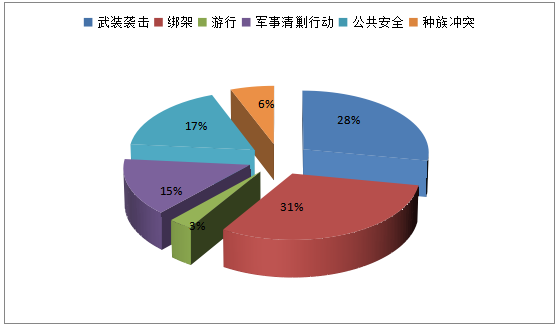
Chart 3: Classification Statistics of Deaths in February
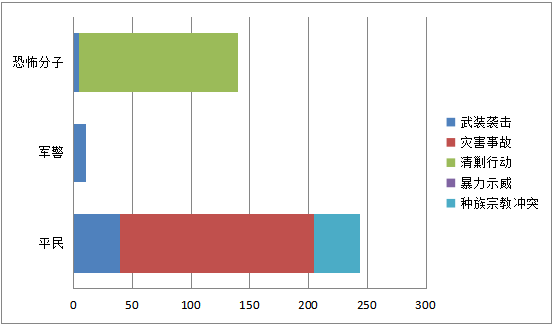
Chart 4 Comparison of the Number of major Security Incidents in February and January
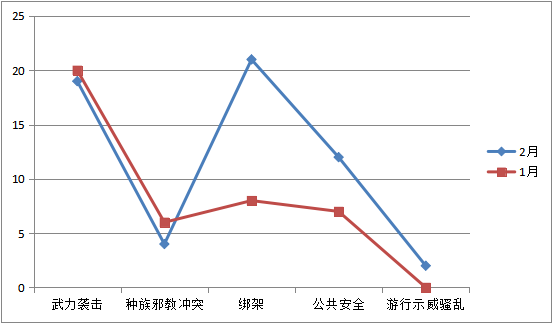
Ii. Risk Early Warning and Prevention Suggestions
Chart 5: Recent social Security Risk Warnings in Asia on the 5th
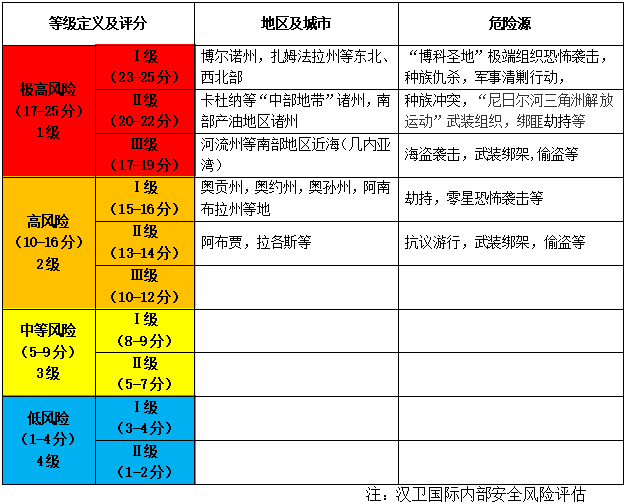
Given the complex social environment and high-risk security assessment in Nigeria, the following security measures are recommended:
The first is to provide full-time security services during travel.In remote rural areas of Nigeria, the police force is limited and the road infrastructure is poor. As a result, the response of security forces to violent crimes and riots and conflicts is often seriously delayed. Therefore, Chinese-funded enterprises and others should promptly obtain the latest local security intelligence, conduct specific security assessments of the travel destinations, and have security personnel accompany and protect them.
Second, operate in compliance with local laws and regulations.In February, multiple incidents of Chinese citizens being arrested for violating local laws occurred again in Nigeria. For this reason, it is reminded that enterprises and Chinese people in Nigeria should focus on legal operation, abide by the laws and regulations of Nigeria, and avoid getting involved in similar legal disputes and criminal cases.
The third is to effectively avoid risks.Most of the attacks in Nigeria occurred in the northeastern and central-northern parts, especially in Maiduguri in the central part of Borno State, the roads connecting other major towns, the areas bordering Niger, and Zamfarah State. Recently, security incidents have occurred frequently in Kaduna State and Abuja. In the event of a terrorist attack, one should follow the official instructions and get in touch with their specific security service provider to receive timely assistance. Video surveillance is installed at the base, shops, warehouses and residences, and facilities such as trenches, high walls, barbed wire, anti-collision barriers, buffer zones and alarm systems are set up in the camps to strengthen military and police security forces and expand the defense range. At the same time, it is necessary to avoid lingering near areas that may become targets of armed attacks, including government and security force facilities, landmark buildings and religious sites, etc. In Nigeria, it is particularly important to minimize stays in densely populated public places such as the northeastern region, religious festival sites, areas where ethnic groups live together, regions with a high incidence of crime (especially highways and areas where piracy is active in the Gulf of Guinea), oil and gas facilities, government and military camp facilities, diplomatic embassies, religious worship places, schools, markets, refugee camps, bus hubs, and surrounding areas Time.

